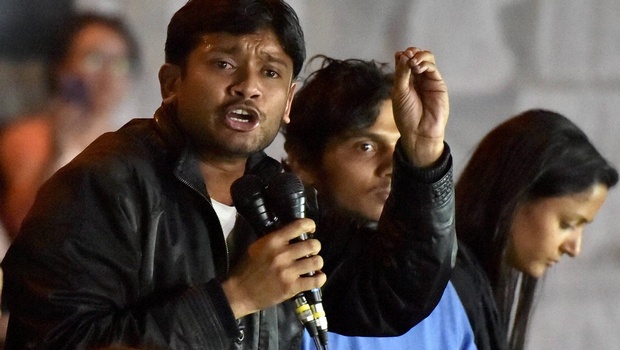
The media calls him “idealistic” because he believes that the promise of the Constitution, not only as it was drafted but even as it was envisoned by Babasaheb Ambedkar, can actually be the basis of concrete transformative action to change India’s deeply divided and unequal society. Like most young activists who share this ideal, Kanhaiya recognises that it is a long and difficult struggle but where he stands out among them is that he has got right to the heart of the problem as to how this change can be brought about democratically in contemporary India.
Kanhaiya identifies education as the key to realising the constitutional goals of equality and social justice. But this is not just some vague do-gooder conception of how everyone should get the opportunity to be in school but a clear direction towards an education system which in its very establishment would challenge all forms of discrimination and inequality. Contrary to current “commonsense” and preference, Kanhaiya argues for a system of free and universal common schooling for all children in institutions where the son or daughter of the President studies in the same classroom together with the children of farmers, workers, the middle-class and the well-to-do. Caste, religious and gender oppression can be overcome only by this constant interaction at study and play among all children and by the state provision of a system of genuinely equal opportunity so that no child is systemically disadvantaged by the “facts of his birth” as Rohith Vemula so poignantly phrased it in his `suicide’ note.
Education cannot be privatised and commercialised, sold to the highest bidder and made available only to those with deep pockets and a sense of entitlement. Thus the importance of demanding adequate scholarships for all researchers at central and state universities, which is the goal of the “Occupy UGC!” struggle that he led as President of the Jawaharlal Nehru University Students Union (JNUSU). Thus the importance of institutions like the Jawaharlal Nehru University (JNU) which Kanhaiya repeatedly emphasises allows students like him from a household run on his mother’s income of three thousand rupees a month as an anganwadi-worker to be able to pursue his doctoral studies.
It is significant that Kanhaiya rejects private high-fee charging universities and professional institutions not only because they restrict access to those who can pay, but also because they put a market value on education reducing it to a system for the production of degrees and “skills” rather than its truly democratic role in promoting critical and independent thought. Thus Rohith is Kanhaiya’s icon and his struggle is a continuation of Rohith’s struggle. At the same time he can understand the frustration and injustice that limited the choices of the constable in Tihar jail who too had wanted to study further but was compelled by circumstances to forget his dreams and take up a job.
Kanhaiya sees freedom of speech, the inalienable right to think independently, as a necessary part of the struggle to protect both the autonomy of the universities and to enlarge the democratic space for dissent in wider society. The right to democratic dissent distinguishes modern democratic constitutional governance from all forms of authoritarian and even fascist governments. The political project of replacing this constitutionalism with what Kanhaiya pithily called a “patented” form of RSS/Sanghi “nationalism” places the State/government/ ruling party or “office” above the people who constitute the nation.
Kanhaiya’s view, as he himself recognises, belongs to the tradition of the freedom struggle, of the national movement against British imperialism with its great icons who contributed to the idea of a modern, egalitarian and democratic India like Jyotiba and Savitri Bai Phule, Rabindranath Tagore, Bhagat Singh, Gandhi, Periyar, Babasaheb Ambedkar, Nehru and Subhash Bose among others.
Delivering the Convocation Address at the Allahabad University in 1946, Jawaharlal Nehru had said: “A University stands for humanism, for tolerance, for reason, for progress, for the adventure of ideas and for the search for truth. . . . If the universities discharge their duty adequately, then, it is well with the nation and the people.” It seems fitting today, when democratic India is faced with perhaps its greatest threat, that a young man heading the students union in the university named after Nehru should be the one to articulate that vision with such force and clarity.
